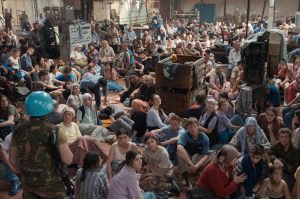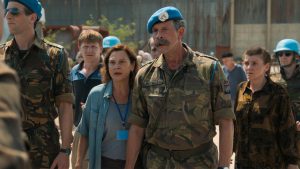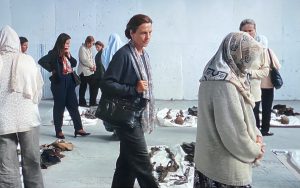The Reel Review
In July 1995, Bosnian Serb troops led by General Ratko Mladic slaughtered more than 8000 Bosnian Muslim residents of Srebrenica. Quo Vadis, Aida? is a harrowing historical drama about that genocide, as told through Aida, a local translator for the United Nations peacekeeping forces. As the nightmare unfolds, a panicked Aida scrambles to try to get her husband and two adult sons to safety.

While there have been several powerful documentaries about the Srebrenica genocide in recent years, this film from writer/director Jasmila Žbanić personalizes the horror of the massacre like no other. The action is taut and the tension palpable, as residents flee their homes for the safety of the U.N. compound. There, they watch the feckless U.N. forces idly stand by as armed Bosnian Serb forces arrive into their “safe zone” and round up thousands onto buses – a death sentence for the men and boys. The way Žbanić lingers on the faces throughout the film is haunting. She wants us to remember them.

The first two words in the film’s title, Quo Vadis (Where are you going?), refer to the Biblical moment when the apostle Peter, fleeing Rome, gathers his courage to return for his crucifixion after seeing the risen Christ. It’s symbolic on multiple levels, from the hopelessness of the situation, Aida’s efforts to save her family, and years later, as she rebuilds her life in Srebrenica.

Jasna Djuricić gives a powerhouse performance as the beleaguered Aida, her face relaying the mind-spinning horrors of the massacre, and the added nightmare that it was at the hands of former neighbors and associates. Boris Isaković’s performance as Mladic is chilling. The film is unforgettable.
REEL FACTS
• Filmed in Mostar, Quo Vadis, Aida? is Bosnia-Herzegovina’s 2021 Oscar nominee for Best International Film.

• In 2017, six years after his capture, the International Criminal Tribunal for the former Yugoslavia convicted Bosnian Serb General Ratko Mladic of war crimes, crimes against humanity and genocide. Deemed responsible for both the siege of Sarajevo and the Srebrenica massacre, Mladic is serving life in prison.
• After the war, the Dutch head of UN peacekeeping forces in Srebrenica, Thom Karremans, was promoted to full colonel. He is now retired and living with his wife in Spain.



